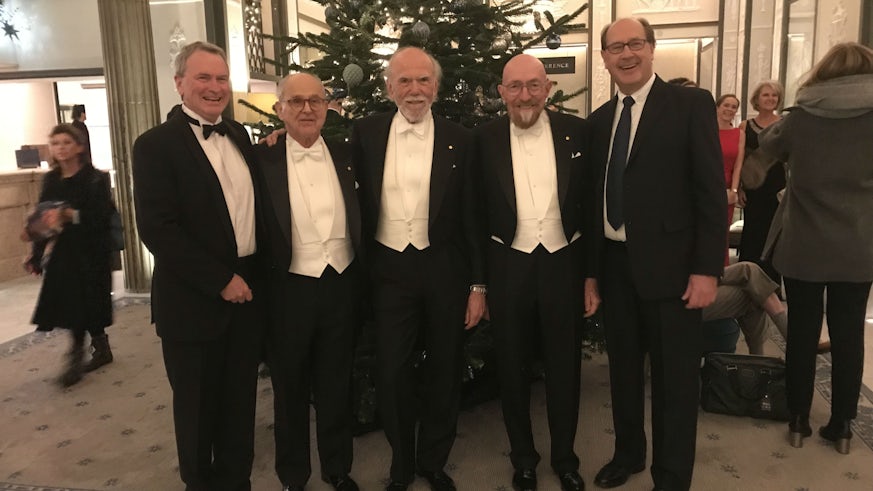Cardiff physicists celebrate Nobel success
11 January 2018

Members of Cardiff University’s Gravitational Physics Group have travelled to Sweden to celebrate with the laureates of this year’s Nobel Prize for Physics.
The most prestigious accolade in physics was awarded to Kip Thorne, Rainer Weiss and Barry Barish for their contributions to the first ever discovery of gravitational waves – a landmark discovery that was made possible thanks to the significant contribution of researchers in the School of Physics and Astronomy.
The awards were presented to the Nobel laureates at a special ceremony in Stockholm by the King of Sweden.
Gravitational waves – tiny ripples in space-time that are emitted from violent cosmic events – were first detected by the Laser Interferometer Gravitational-Wave Observatory (LIGO) team in 2016, thanks to the help of over 1000 scientists from more than 80 institutions.
Research undertaken at Cardiff University laid the foundations for how the gravitational waves were detected, with the development of novel algorithms and software that became the standard search tools for detecting the elusive signals.
Attending the event was Cardiff University’s Professor Bernard Schutz, who was also asked to give a talk on the science behind gravitational waves whilst in Stockholm.
“It was an honour and a treat to be there, and an extra honour to be invited by the physicists of Stockholm to give a talk on the science that was being recognised,” Professor Schutz said.
“On top of that, it was a special pleasure to watch my PhD supervisor and mentor, Kip Thorne, receive the Nobel Prize. I remember Kip visiting Cardiff in 1987 for the first-ever international conference on how to do data analysis for the then-planned detectors, one of many aspects of the detection effort that he took a deep and creative interest in.”
Since gravitational waves were first detected in 2015, they have since been detected a number of times by detectors in the US and Italy, providing an unprecedented insight into some of the most mysterious events in the Universe.
In anticipation of the detectors beginning their third observation run later this year, Professor Stephen Fairhurst, from the School of Physics and Astronomy, has been appointed as Deputy Chair for the LIGO Programme Committee.
As part of the role, Professor Fairhurst will help to steer the research priorities of the LIGO Scientific Collaboration.
He said: “The award of the Nobel prize to the pioneers of LIGO is recognition of the birth of gravitational wave astronomy. Our challenge now is to plan for the future, with ever improving detectors and observations of new astrophysical phenomena.”




